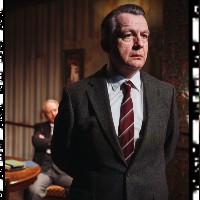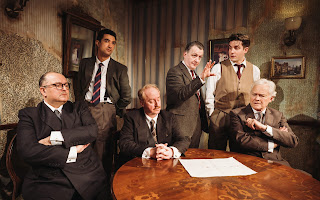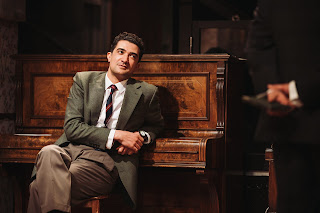Their social dynamics soon reveal themselves, with younger scientists Bagge (Archie Backhouse) and Weizsäcker (Daniel Boyd) fitting the role of the cool kids, forming a clique around their idol Heisenberg (Alan Cox.) Possibly because they think he can get them meth.
Hahn (Forbes Masson) and von Laue (David Yelland) discuss physics and bicker like an old married couple, while Diebner (Julius D’Silva) is treated as a pariah: He's not the only one of the men to have been a card-carrying Nazi, but he's the only one to have joined the party entirely of his own free will, and shows little remorse now that he knows exactly what the regime he was working for had planned. Farm Hall is the kind of drama that's tricky to pull off but when it works this well is fascinating: Under the entertaining, sometimes comic chats, arguments and scientific discussions, their darker concerns are revealed.
So we have their varied reactions to the Holocaust they are now aware of, both in terms of how much it weighs on their consciences, and the more selfish worries of whether they'll be considered war criminals and assassinated, and how their names will be remembered by history. There's also individual concerns - most have families still in Germany, but while most are in the American zone, Bagge's discovery that his own area has fallen into the Soviet zone makes him wonder if he'll ever see them again. The scientists are generally confident that their superior knowledge will mean they're considered too useful not to keep alive, but they don't know how far their US rivals have progressed.
It's all very gripping so far in its own right but Moar has a twist of the knife about halfway through, as the men are given a radio to hear the news that their American counterparts have not only successfully designed the bomb they couldn't, but they've used it. In a play that's already juggling extreme responses, we now get the men dealing with the guilt over the epic scale of death caused, not by them directly, but by the arms race that they contributed to for so much of their lives; but they also can't disguise how much it eats them up that while they still hadn't figured out the theory, the Americans (admittedly with vastly superior resources) had done it in practice.
Stephen Unwin's unfussy production allows a wealth of ideas, from the way the men try to excuse themselves from their complicity with the Nazis, to the question of whether Heisenberg might have consciously held back his own team's progress to avoid becoming the cause of so much destruction, to take hold gently but firmly. It's one of those steadily impressive shows that leaves your brain tripping over itself trying to keep up with the ideas it touches on, and a play of bitter contrasts: While Hahn, without whose work on nuclear fission the bomb wouldn't have been possible, is borderline suicidal with grief at it, news comes in that it's won him the Nobel Prize. But perhaps the darkest irony comes when the scientists discuss the obstacles that Hitler put in the way of their own progress: They might, after all, have been able to deliver the bomb, if their Jewish colleagues hadn't been taken off the project.
Farm Hall by Katherine Moar is booking until the 8th of April at Jermyn Street Theatre (returns only,) then continuing on tour to Bath.
Running time: 1 hour 25 minutes straight through.
Photo credit: Alex Brenner.





No comments:
Post a Comment